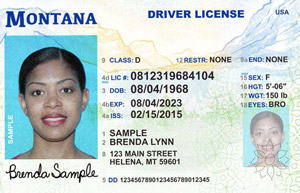- 0 Incorrect (7 allowed to pass)
- 0 Correct
- Updated for February 2025
- Based on official Montana Driver's manual
Free Montana MVD Permit Practice Test Three 2025
You can’t wait to dive into Main Street’s lively and upbeat scene in Bozeman. However, if you don’t have driving privileges, you’re going to be hoofing it through the bitter cold. Your best way to warm up is to get a Montana learner’s permit that will allow you to develop your driving skills and set you on your way to freely cruising the open road. Before you can go the first mile, you’ll need to spend some time learning the rules of the road. For you to be successful in learning traffic laws and basic safe driving principles, you’ll need to use a comprehensive resource.
Although there are several requirements you’ll need to satisfy, a key step in earning your learner’s permit is passing a driver’s knowledge test. You will be required to answer 82% of the 33 questions correctly to receive your learner’s permit. Our free Montana MVD Permit Practice Test fully addresses the topics you must know to hit that target. The practice test will teach you basic driving principles and how to apply them to your driving practices. You’ll get a look at questions just like the ones on the official knowledge test. This approach allows you to plan how to deal with the most complex and confusing questions that could lead you to incorrect answers.
The Permit Practice Test uses a study method that goes beyond simply reciting the answers to the test questions. It is based on the most recent Montana MVD driver’s manual (Montana DMV Handbook (MT Driver's Manual) 2025) and is up to date as of February 2025. This current information will boost your confidence and test-taking skills. If you believe a study guide can produce the same results, you’ll be out walking in the cold. The practice test includes 40 multiple-choice questions to support your learning. If you submit a wrong answer, the practice test will provide you with a detailed explanation of the correct one. Study guides merely help you memorize the answers to the questions, leaving out the reasoning behind them. If your goal is to become an excellent driver, you will need to be well informed to make split-second decisions. The practice test uses a technique that enables you to react quickly and exhibit exceptional driving skills.
If Zootown isn’t exactly what you were expecting, you should check out the practice tests for other U.S. states and Washington D.C. at https://driving-tests.org/academy/drivers-license.
- Perfect for learner’s permit, driver’s license, and Senior Refresher Test
- Triple-checked for accuracy
What you need to know

What to expect on the actual MT MVD exam
questions
correct answers to pass
passing score
minimum age to apply
List of questions (classic view)
- At dusk or whenever it is cloudy and visibility is reduced,
- If your vehicle breaks down at night, use _________ to prevent an accident.
- Uncontrolled intersections are
- You see a sign shaped like a pennant. What does this sign mean?
- Vehicles approaching a roundabout must
- _________ mean(s) that passing is not allowed in either direction.
- If you start to become sleepy while driving, you should
- If it starts to rain on a hot day, use caution because the pavement may be slippery for the first few minutes. This is due to
- Which of the following right-of-way rules is FALSE?
- Which of the following are two types of speed signs?
- To enter a roundabout, you must _________ whether you need to make a right turn, a left turn, or a U-turn or continue forward.
- In a typical passenger car, partial hydroplaning can begin at speeds as low as
- Where there are four or more lanes with traffic moving in opposite directions, what does a double solid yellow line mark?
- A double solid white line separates two lanes of traffic
- If you start to skid, you should
- You should avoid _________ while crossing railroad tracks.
- When you see a pedestrian trying to cross the road,
- When passing a truck or other large commercial motor vehicle, you must watch out for
- What condition is defined as 'hydroplaning'?
- What does this sign mean?
- When turning left from a two-way street onto a one-way street, you should
- On a four-lane divided roadway or a one-way road, a solid yellow line usually marks
- What does this sign mean?
- What does this sign mean?
- Which of the following statements about headlights is FALSE?
- If your right wheels accidentally drive off the roadway onto the shoulder,
- Warning signs are placed along the roadways to
- When passing a bicyclist, always exercise extreme caution since
- What does this sign mean?
- What is the rule of thumb for passing?
- On a highway, signs with black letters or symbols on an orange background provide
- You may not park your car in any of the following places, except
- Which of the following rules about turning is FALSE?
- If a blind pedestrian with a white cane or guide dog is waiting at a crosswalk, you must
- When going down a steep hill, you should
- Crossing a solid white line is
- In Montana, you must use your headlights whenever visibility is 500 feet or less and
- On an expressway, you can avoid highway hypnosis by
- If you are being tailgated, you should NOT
- On multilane roads, you should avoid driving alongside other vehicles because
More resources
- Alabama: Test 1 / Test 2
- Alaska: Test 1 / Test 2
- Arizona: Test 1 / Test 2
- Arkansas: Test 1 / Test 2
- California: Test 1 / Test 2
- Colorado: Test 1 / Test 2
- Connecticut: Test 1 / Test 2
- Delaware: Test 1 / Test 2
- District of Columbia: Test 1 / Test 2
- Florida: Test 1 / Test 2
- Georgia: Test 1 / Test 2
- Hawaii: Test 1 / Test 2
- Idaho: Test 1 / Test 2
- Illinois: Test 1 / Test 2
- Indiana: Test 1 / Test 2
- Iowa: Test 1 / Test 2
- Kansas: Test 1 / Test 2
- Kentucky: Test 1 / Test 2
- Louisiana: Test 1 / Test 2
- Maine: Test 1 / Test 2
- Maryland: Test 1 / Test 2
- Massachusetts: Test 1 / Test 2
- Michigan: Test 1 / Test 2
- Minnesota: Test 1 / Test 2
- Mississippi: Test 1 / Test 2
- Missouri: Test 1 / Test 2
- Montana: Test 1 / Test 2
- Nebraska: Test 1 / Test 2
- Nevada: Test 1 / Test 2
- New Hampshire: Test 1 / Test 2
- New Jersey: Test 1 / Test 2
- New Mexico: Test 1 / Test 2
- New York: Test 1 / Test 2
- North Carolina: Test 1 / Test 2
- North Dakota: Test 1 / Test 2
- Ohio: Test 1 / Test 2
- Oklahoma: Test 1 / Test 2
- Oregon: Test 1 / Test 2
- Pennsylvania: Test 1 / Test 2
- Rhode Island: Test 1 / Test 2
- South Carolina: Test 1 / Test 2
- South Dakota: Test 1 / Test 2
- Tennessee: Test 1 / Test 2
- Texas: Test 1 / Test 2
- Utah: Test 1 / Test 2
- Vermont: Test 1 / Test 2
- Virginia: Test 1 / Test 2
- Washington: Test 1 / Test 2
- West Virginia: Test 1 / Test 2
- Wisconsin: Test 1 / Test 2
- Wyoming: Test 1 / Test 2
Your go-to, trusted source
Experience the Driving-Tests differenceOur commitment to accuracy and quality in our practice tests
Explore our rigorous, multi-tiered verification process that ensures each question mirrors the official manual for unparalleled accuracy.

At Driving-Tests.org, we understand the importance of reliable and accurate practice tests to help you prepare for your DMV exam. That's why we've developed a meticulous process to create and continually update our practice questions, ensuring they reflect the most current driving laws and regulations.
Here's an inside look at how we maintain the highest quality in our practice tests.
Content Creation and Verification Process
- Alignment with Official Manuals:
Every question we develop is based on the most recent version of each state's official driving manual. Our team regularly monitors each state DMV's website for the latest updates to ensure our practice tests are always aligned with the most current information. - Community Feedback Integration:
We leverage feedback from our vast community of users to understand which topics are most frequently tested. This helps us focus on the areas that are most relevant and beneficial for your preparation. - Expert Content Creation:
Our in-house editor, Steven, who has extensive experience in driver education, crafts each question with precision. He conducts a thorough review of each question against the official manuals to ensure accuracy. - Rigorous Review Process:
Once Steven has finalized a set of questions, our team conducts a joint review session. This second level of scrutiny involves content accuracy, proofreading, and fact-checking to eliminate any errors. - User Feedback Mechanism:
After a question goes live on our site, we keep the lines of communication open. Each question features a feedback button, inviting users to report any issues or errors. This continuous feedback loop allows us to address and rectify any concerns promptly. - Responsive Updates:
In line with our commitment to accuracy, we quickly update our practice questions to reflect any changes in the DMV manuals. Additionally, we update the free electronic copy of the state's driver's license manuals on our site, typically within a few days after the DMV publishes them.
Our thorough quality control process ensures that you have access to practice tests that are as accurate and up-to-date as possible. We believe in the power of well-prepared drivers and are dedicated to providing you with the best study tools to help you succeed on your DMV exam.
Pass the First Time - Guaranteed
Before you view your test results, discover how you can pass faster with Premium:
Real Exam-Like Montana Questions
Get 650+ questions seen on the real test
Money-Back Guarantee
If you don't pass, it costs you nothing
97% Premium Users Pass on Their First Try
Compare with the average US passing rate of 49%
